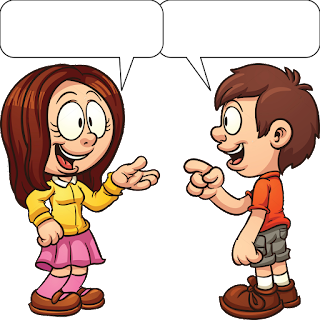Due to a medical issue, I am rerunning a column from 2017. If you love dialogue, it is worth reading--even if you read it seven years ago. After all, great dialogue is one thing that lures readers and viewers back over and over and over ...
Remember the TV show Name That Tune? The idea was to see how few notes
of a song a person could hear and correctly name that tune. I don't
know how well I'd do on that show, but if there were a Name That Movie
show, I would clean up--assuming they asked about movies I've seen.
Spoken dialogue, I've found, sticks with me. I adore snappy and
heartfelt dialogue in books too, but for whatever reason, I don't retain
it the way I do dialogue from movies and TV shows. (You'd think, then,
that I would have good recall for dialogue from audio books, yet not so
much.)
Anyway, I started thinking about ear memory the other day when I turned
on the TV. I wasn't looking at the screen. All I heard was, "Always,"
and I knew it was the late Alan Rickman as Professor Severus Snape in Harry Potter and the Deathly Hallows Part II.
(I might have seen that movie a few times.) That one word transported
me back right to the exact scene in the movie. Rickman delivered it
perfectly, revealing so much about Snape's character. Even now,
recalling the scene breaks my heart a little all over again.
 | |
| Alan Rickman |
Here are a few examples. They may not be the most well-known from each movie, but they certainly stand out:
"I want the truth!" "You can't handle the truth." Tom Cruise and Jack Nicholson in A Few Good Men
"You can't kiss her!" Sally Field in Soapdish
"Why can't I write shit like this?" Whoopi Goldberg in Soapdish
"Shall we play a game?" Joshua (computer) in War Games (even a computer can make dialogue memorable)
 |
| More Alan Rickman |
"There was more than one lobster present at the birth of Jesus?" Emma Thompson in Love Actually
"Oh jeez. I'm getting pulled over. Everybody just pretend to be normal." Greg Kinnear in Little Miss Sunshine
"I guess it comes down to a simple choice. Get busy living or get busy dying." Tim Robbins in The Shawshank Redemption
"And for what? For a little bit of money. There's more to life than a
little money, you know. Don'tcha know that?" Frances McDorman in Fargo
"You don't really know how much you can do until you stand up and decide to try." Kevin Kline in Dave
"Here's looking at you, kid." Humphrey Bogart in Casablanca
"A toast to my big brother, George, the richest man in town." Todd Karns in It's a Wonderful Life (It's interesting that one of the most memorable lines in the film is from a minor character.)
 |
| And even more Alan Rickman |
"By Grabthar's hammer, by the sons of Warvan, you shall be avenged." Alan Rickman in Galaxy Quest
"Hello. My name is Inigo Montoya. You killed my father. Prepare to die." Mandy Patinkin in The Princess Bride
"You're going to the cemetery with your toothbrush. How Egyptian." Robin Williams in The Birdcage
"Snakes. Why did it have to be snakes?" Harrison Ford in Raiders of the Lost Ark
"It was like ... magic." Tom Hanks in Sleepless in Seattle
"I'm not crazy. I've just been in a very bad mood for forty years." Shirley MacLaine in Steel Magnolias
"But I don't want to be a pirate." Jerry Seinfeld in Seinfeld
"I'm not insane. My mother had me tested." Jim Parsons in The Big Bang Theory
 | |||
| Alas, not Alan Rickman but still wonderful |
Inspired to go watch a great movie or to try to write your own memorable dialogue? Great. But before you go, please share your favorite movie or TV show line(s) of dialogue. The lines that stick with you, that you remember sometimes out of nowhere. The words that transport you and make you smile. And if you know how to make dialogue on the page stand out in memory the way spoken dialogue does, please let me know. I'm open to any and all tips.

.JPG)
























